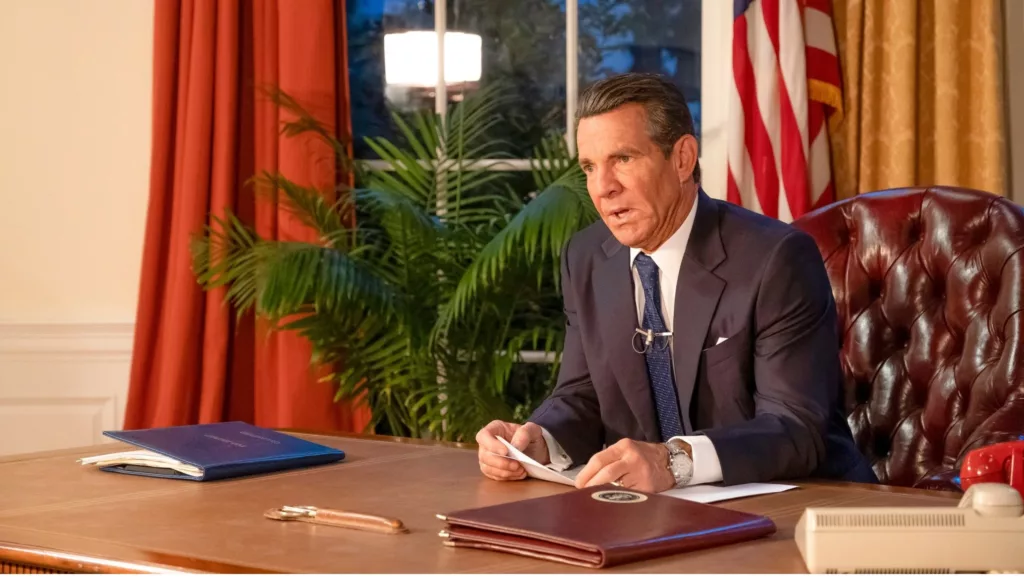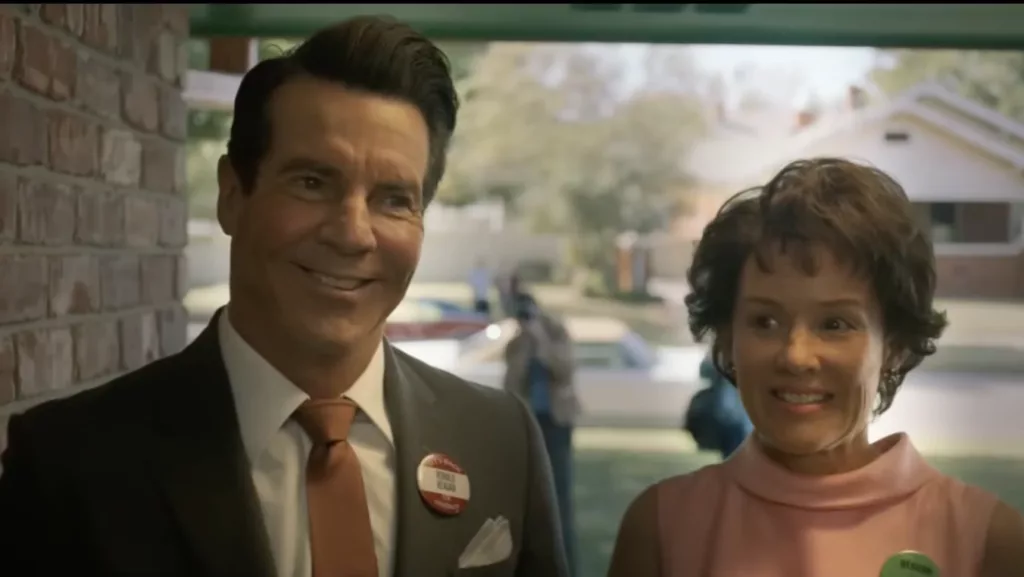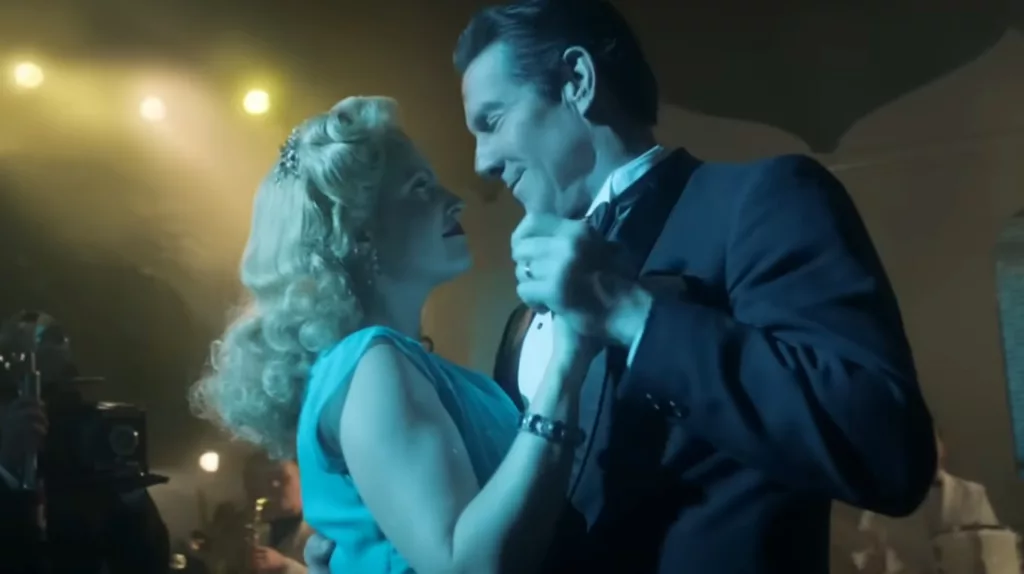Dennis Quaid leads the cast of Reagan as the 40th President himself, telling his story from a small-town upbringing to Hollywood stardom to commander-in-chief. Director Sean McNamara aims to capture Reagan’s journey in a positive light, with help from Penelope Ann Miller as Nancy and notable supporting players.
The film follows Reagan through career peaks and personal struggles, with flair shown in his acting days and devotion to Nancy during life’s challenges. Their bond anchors the biopic as dramatic reenactments unfold. We see Reagan rise as SAG leader and later California governor, cementing his conservative views challenged by communism.
Quaid embodies the Gipper with mannerisms conveying charm and wisdom. His passion comes through as the film highlights confronting issues as president, from “Reaganomics” to the Berlin Wall speech. International crises also get coverage, like negotiations with Soviet chief Gorbachev played by Olek Krupa.
Yet for all its accomplishments spotlighting Reagan’s impact, the movie avoids nuanced discussion. Challenges like Iran-Contra get short shrift. A more balanced approach could have provided greater insight into both the strengths and limits of this consequential presidency. Instead, viewers see a simplified heroic figure, missing the dimension a leader of Reagan’s stature deserves.
By shining brightly on triumphs but leaving darker areas in shadow, the film risks losing some of its audience. A fuller portrayal tracing both gifts and faults may have done more justice to its subject and proven more engaging for those seeking depth on this “Great Communicator.”.
The Man Behind the Role
We can hardly doubt Dennis Quaid was born to play Ronald Reagan after seeing his performance. He seamlessly inhabits the Gipper through precise vocal inflections and body language that embody the man. But where Quaid shines in portraying surface traits, the film falls short in coloring Reagan as a full human being.
From start to finish, Reagan basks in an unyielding glow. Every choice and deed bears the fingerprints of destiny, guided by heavenly forces. But politicians make mistakes, and great leaders still wrestle with inner demons unknown to the people. This version of Reagan shows little struggle or self-doubt, skating past controversies with not a scrape.
Reagan’s presidency changed America in lasting ways, for good or ill. A biopic that aims to honor his legacy shouldn’t fear complexity. By glossing over nuances like objections to his “trickle-down” economics or sluggish response to HIV/AIDS, the movie undermines its own goal of understanding him. We leave knowing less about what motivated this iconic figure beyond the narrator’s constant praise.
Even Quaid’s light dims beside such one-dimensionality. His abilities deserve a role carved from the reality of a human presidency, warts and all, not a hollow vessel for predetermined glorification. Ronald Reagan was assuredly a consequential leader, but reducing the full tapestry of events to bullet points denies viewers and denies the man himself. A balanced portrait could have done more justice to history and to Quaid’s masterful work.
The Straight and Narrow
Reagan aims to pack significant portions of history into its runtime. Viewers see coverage of major moments like conflicts with Gorbachev and the infamous Berlin Wall speech. But the movie struggles to find depth in these complex areas.
Events unfold through a narrow lens, without nuance. Crisis situations get short shrift or fall by the wayside. Nothing reflects this more than glaring omissions like Reagan’s non-response to HIV/AIDS. Such nuanced topics become footnotes to place all focus on chilly Cold War battles.
Even portrayed incidents lack heft. Scenes serve more as rapid bullet-point sketches than substantive scenes. The result sidesteps knotty realities to favor an uncomplicated, hero-centric approach. But great leaders merit exploring both lustrous triumphs and hard truths.
By cherrypicking highlights and sugarcoating lowlights, an unbalanced picture emerges. An immersive biopic deserves grappling sincerely with its subject’s dark patches alongside bright ones. Without this, Reagan settles for a thin recounting over a penetrating portrayal.
Not helping matters is a contrived narrating device that strains credibility. A confidant KGB spy paints an incomplete image through rose-tinted reminiscing alone. Rather than explore gray zones, Reagan sees history strictly as a Manichean conflict rendered in black and white. Reality existed in living color, a fact eluding its tidy two-dimensional worldview.
With good intentions laid aside, this biography falls short on follow-through. A fuller, fairer handling of leadership complexity and factual backdrop could have recognized Ronald Reagan in all his dimensions, for better and worse. But the movie prefers a straighter and narrower path.
Telling the Tale
Reagan aims to stuff multitudes of moments into its runtime. But McNamara’s directing style sometimes struggles under the weight. By opting for a fast-paced recap approach, some intricate periods get short shrift or feel rushed.
We see this when delving into weightier subjects demanding nuance. Scenes around trickier topics like Iran-Contra play out in an almost cartoonish manner. The effect removes us from reality instead of drawing us deeper in.
McNamara’s hand also reaches for dramatization at odd junctures. Small details get dialed up to implausible levels, as though every action demands the utmost grandiosity. But not all impactful leadership lessons arise from overwrought gestures. Understatement serves truth better at times.
Choppy pacing complements these issues, perpetually shuttling between periods. One scene scarcely wraps before whisking to the next topic. This breakneck style leaves fragments where fuller pictures could emerge.
Drawing all arcs together smoothly proves a tall task, yet creativity in structure and tempo might have compensated better. Reagan’s full sweep deserves a narrative letting moments breathe as life does—not a sped-up highlights reel.
With complexity as his subject, McNamara took on no simple charge. But by leaning on brevity over depth, the richness of history and humanity get abbreviated. Reagan the man and president merited a storytelling approach honoring nuance.
Sidelined Support
While Quaid anchors the film, lesser characters feel like afterthoughts. Miller fully embraces Nancy’s role, infusing her with authentic care for Ronald. But the First Lady merits greater substance beyond mere devotion.
Elsewhere, players flounder without nuance. Suvari struggles to break free of Jane Wyman’s one-note mold. Many foreign figures get short shrift too—Down seems stifled as Thatcher. Crammed among heavyweights, they struggle in the margins.
Even noteworthy players appear stifled. Voight delves into Viktor’s psyche, yet his narration sidetracks the vérité. As Reagan’s colleagues, contemporary politicians periodically pop up, but with as little depth as background extras. Potential for vibrant portraits goes untapped.
With so many biopics relying on personality, stronger supports could have enriched understanding. Scholars recognize no person exists apart from relationships. But sidelines get crowded here, squeezing out room for others’ light to shine through Reagan.
By privileging plot above people, the human factor diminishes. Great leadership incorporates diverse energies—not solo feats. A surer supporting cast may have balanced sentiment with insight, illuminating communal triumphs transcending single heroes. As is, they remain pleasantly posed yet quietly sidelined from center stage.
A Nuanced View of History
Reagan soars on waves of patriotic fervor, recalling an era when America felt sure of communism’s demise. It’s easy to share nostalgia for times seeming simpler. But history lessons require showing both bright and dark in full complexity.
By framing decades-old tensions in black-and-white, tough questions get sidelined. Where supporters see resolute leadership, others see impacts like neglecting public health crises. Steeped as it is in nostalgia for a bygone presidency, alternative perspectives fade into the background of Reagan’s story.
Viewers learn little of policy details beyond skimming surfaces. Why certain choices worked while others failed remains unexplored territory. A figure as controversial as Reagan merits examining both effects and intentions beyond easy valorization or condemnation alone.
Peeling historical layers back with nuance presents a fuller picture for all. No life impacts millions without both successes and regrets. By declining depth on Reagan’s full policy landscape and his times, the film loses chances to meaningfully analyze both ethics and impacts that stretch across generations.
Reagan the man emerges more clearly through a balancing lens. Where hopes soared, shortfalls mattered too. A complete accounting respects complexity. With care to multiple truths in history and humanity alike, this biography might have found greater understanding in its telling of the leader and the times.
Balancing Act
With Quaid embodying Reagan so fully, the film risks missing chances to understand this impactful figure in full. His able performance deserves a role exploring equal measures of triumph and flaw.
Instead, the script sidesteps knotty patches, preferring panegyric to nuance. But leadership lessons arise from facing all aspects, not just celebratory ones. A balanced approach honors complexity where it exists, in politics as in lives.
Reagan undeniably shaped his times through both shining acts and missteps deserving evaluation. By shrinking from complexity to pursue mythmaking alone, this film lets down the very subject it aims to honor.
Viewers see a saint more than a statesman, losing opportunities to gain new perspective on history and humanity. Those who lead millions deserve biopics wrestling sincerely with their full legacies, not hagiographies.
Quaid illuminates Reagan the man, yet needs a story delving deeper to do justice to his subject and craft. Instead, it settles for propaganda over portraiture, celebration over understanding. A fuller telling may have better served both leader and public with insight, not idolatry alone.
The Review
Reagan
While Dennis Quaid's committed performance as Ronald Reagan anchors the film, McNamara's picture overall fails to strike the right balance in examining this complex figure. By neglecting nuance in favor of constant praise, Reagan the movie settles for a caricature over a fully fleshed-out portrayal. A more even-handed approach that peered beneath the surface could have offered fresh insight into this momentous period and president. However well-intentioned, this biopic reduces its subject and misses opportunities to meaningfully analyze triumphs alongside genuine flaws.
PROS
- Dennis Quaid delivers a committed lead performance that captures Reagan's mannerisms
- Covers many significant political events and relationships from Reagan's career
- Offers a sense of Reagan's journey from entertainer to two-term president
CONS
- Overly simplistic and one-sided portrayal that lacks nuance
- Skims over or ignores important controversies and crises
- Unbalanced hagiographic tone fails to treat Reagan as a complex figure
- Poorly developed supporting characters and plot details
- Prefers propaganda over serious examination of policies and impacts






















































Discussion about this post